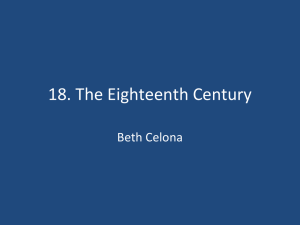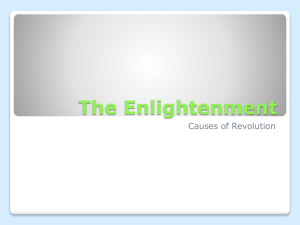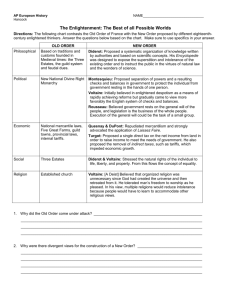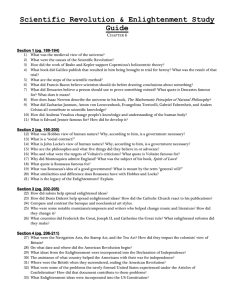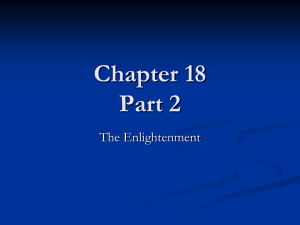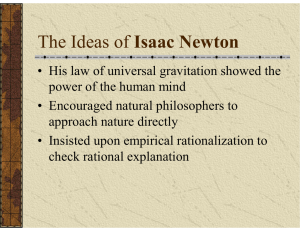age of genuis (WILL USE)
advertisement
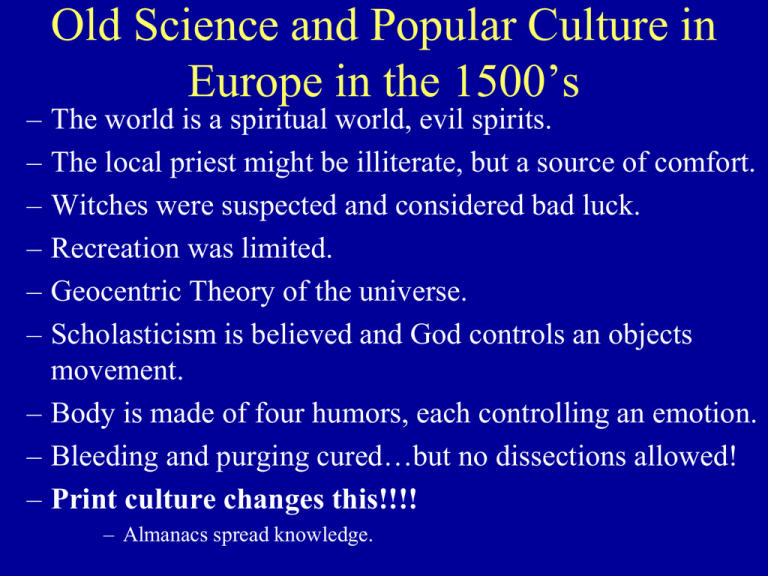
– – – – – – Old Science and Popular Culture in Europe in the 1500’s The world is a spiritual world, evil spirits. The local priest might be illiterate, but a source of comfort. Witches were suspected and considered bad luck. Recreation was limited. Geocentric Theory of the universe. Scholasticism is believed and God controls an objects movement. – Body is made of four humors, each controlling an emotion. – Bleeding and purging cured…but no dissections allowed! – Print culture changes this!!!! – Almanacs spread knowledge. Four temperamental tendencies Blood: good spirits Black: melancholic, depressed Yellow: choleric, hostile Phlegmatic: slow and complaisant The Scientific Revolution Swept Europe • Experimentation through observation started the Scientific Revolution. • Verifying results by the Scientific Method. • Bacon- Inductive Reasoning • Descartes- Deductive Reasoning…’Cogito,ergo sum’ Cartesian Dualism • Astronomy, Physics, Chemistry and Anatomy Bacon Descartes Scientific Revolution • Scientific Societies- promoted to research and spreading knowledge • Women & Science- considered inferior and excluded from education, but worked along side of husbands and fathers (Maria Winkleman, Maria Cunitz & Margaret Cavendish) • Religion• Superstition • Science and the Church • Spinoza & Pascal • Deism • Atheist Cavendish The Social Contract • Thomas Hobbes and John Locke were two English philosophers who lived through the English Civil War. • Hobbes thought that man was cruel, and greedy. To escape anarchy one needed to live by a social contract. A strong government = peace…..wrote Leviathan • Locke thought that people were basically good. People had natural rights, life liberty and the right to own property. If government violates the rights…then good-bye government. Hobbes Locke Astronomy • Geocentric Theory • Copernicus and the heliocentric theory. Proved nothing…got people thinking!!!! • Tycho Brahe • Kepler • Galileo Brahe Kepler Physics, Chemistry and Anatomy • Anatomy• Vesalius and Harveyexperimentation and observation to improve medicine. • Physics• Isaac Newton - Principals of Mathematics . Newton and Leibniz developed calculus. • Chemistry• Robert Hooke - the theory of cells. • Lavoisier and Boyle –Fathers of Chemistry. Harvey Newton The Enlightenment • The Enlightenment Applied Scientific Ideas to Politics • The 1700’s are referred to as the “Age of Enlightenment” • Science and Reason could explain everything in the Universe. • Rationalism - truth is arrived at by using rational, logical thinking. Everything in the world can be explained. (Descartes, Kant, Leibniz) Descartes Enlightenment • Economic change & political reform…. • Possible AND desirable ….New idea? RADICAL • Movement of people & ideas….ENLIGHTENMENT Think of possibilities…not just actualities. • Apply rules of reason to EVERYTHING…. • CHIEF DUTY: Common desire to reform thought, society, & government for the sake of HUMAN LIBERTY…In touch with common people Influences…. 1. Isaac Newton— Avoid metaphysical/supernaturalism. If nature was rational, society could also be organized rationally… 2. John Locke- Human nature can be molded by changing environment.. soo change environment! 3. Great Britain—post-1688 4. France & Louis XIV 5. Print Culture—reading is a GOOD thing!! Great Britain—post-1688 • Enlightened reforms benefit all • Religious toleration (Voltaire) • Relative free speech/press • Limited monarchy & Parliament—political sovereignty • Courts protected citizens • Small standing army • Domestic economy—less regulated Liberal policies: Prosperity/stability/loyalty Britain= significantly freer than ANY European nation France & Louis XIV • Absolute monarchy • Large standing army • Heavy taxation • Religious persecution • Restrictions on free speech/press Print Culture… • Journals, Books, Newspapers, and Pamphlets • Printed word chief vehicle for communication – Ideas/opinion/thought • Who are the readers? Monarchs, Nobles, Upper middle classes – bourgeoisie • ‘NEVER UNDERESTIMATE THE POWER OF THE PEN OR THOSE WHO BUY INK BY THE BARREL’ Crusaders of the Enlightenment -The thinkers of the Enlightenment were called philosophes. -were critics of society and government. -used the printed word to spread ideas. -The Encyclopedia, was published and edited by Denis Diderot Philosophes: A bunch of guys sitting around in some woman’s living room (salon), chatting & discussing current events—asking themselves: “What’s wrong with our society?” “How can we fix it?” Crusaders of the Enlightenment Baron de Montesquieu • The ideas of John Locke inspired Montesquieu. • Montesquieu wrote his book, “The Spirit of the Laws” • Liked the English government… separation of powers • Influenced the U.S. Constitution. Montesquieu Voltaire Voltaire “Crush the Infamous Thing” • Francois-Marie Arouet (Voltaire) was a famous writer. • Voltaire was imprisoned for a time in the Bastille until he fled to England & liked the English political system. • A defender of the right to free speech. • Becomes the symbol of the Revolution. • ‘I do not agree with what you have to say, but I'll defend to the death your right to say it.’ • ‘Each player must accept the cards life deals him or her: but once they are in hand, he or she alone must decide how to play the cards in order to win the game.’ • ‘Behind every successful man stands a surprised mother-in-law.’ “If there were just one religion in England, despotism would threaten, if there were two religions, they would cut each other’s throats, but there are thirty religions, and they live together peacefully and happily.” ~Voltaire Philosophic Letters on the English, 1733 “Churches hindered the pursuit of a rational life and the scientific study of humanity and nature” Rousseau -Jean-Jacques Rousseau wrote “The Social Contract.” -said that man had been born pure, but was corrupted by society. -The free state of man can only be maintained if they choose their own government. -Popular sovereignty is the will of the people. -distrusted reason and logic. -thought the individual should be subordinate to the group or masses. “Much of world’s evil is caused by uneven distribution of wealth” Discourse of the Origin of Inequality, 1755 Mary Wollstonecraft and Adam Smith -A feminist who wrote “A Vindication of the Rights of Woman.” -Advocated education for women and equality with men. Physiocrates -urged a policy of laissez-faire -limited tariffs or taxes. -Adam Smith wrote “Wealth of Nations” argued for the free market or supply and demand. -The market place was better off without government interference. Enlightened Despots TOLERATION of religious minorities REFORM of institutions ABSOLUTISM (DUH!) PATRONAGE of philosophes Enlightened Despots (ruling based on rational reasoning, ideas are a tool for ruling) Frederick II (the Great) • • • • ‘First servant of the state’ (r. 1740-1786) Military Genius Enforced a centralized bureaucracy • Believed in religious toleration • Into culture (arts, music,& thinking) • Offered little social mobility Joseph II of Austria • (r. 1780-1790) • Reformed Austria’s social classes – Eliminated serfdom – Edict of Toleration (1781) Granted religious toleration & equal legal status to all – Wanted to have more control of the church Catherine the Great • • • • (r. 1762-1796) Strong German Ruler Abolished torture and capital punishment Believed in equal rights for girls education Expanded serfdom, even with the Pugachev Revolt • Added more territory Partitioning of Poland (1772,1793 & 1795) • Austria, Prussia and Russia wanted Poland’s land • Helped to maintain balance of power • Enlightened rulers laid foundation for the revolutions to come!!!! Mid 18th Century Wars After the Peace of Utrecht, rivalries start up again England vs. France and Prussia vs. Austria over Germany • Pragmatic Sanction (1713) • War of Austrian Succession (1740-1748) • Frederick II (the great) attacked Austria, defying the Pragmatic Sanction…wanted the resource rich Silesia • France/Prussia vs. Austria/England • Treaty of Aix La-Chapelle 1748 • Diplomatic Revolution of 1756- Austria and France form alliance against Prussia Mid th 18 Century Wars • Seven Years War- 1756-63 ‘1st truly world war’ • • • • Frederick invaded Saxony Prussia/England vs. Austria/France/Russia/Sweden Treaty of Hubertusburg England and France kept fighting in Caribbean, India and North America • Britain won due to large navy • Treaty of Paris 1763- England got everything east of the Mississippi River, and a dominant position in India. France kept sugar plantations in Caribbean • American Revolution • Treaty of Paris 1783- Colonies became free, British lost areas in Africa, Caribbean and Florida to France and Spain
